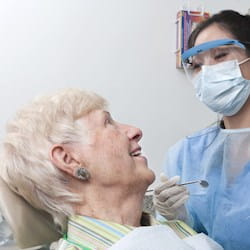BACKGROUND
Dr C is a GDP in a mixed private/NHS practice. She contacts MDDUS for advice on an NHS patient who recently returned from abroad having had multiple units of linked crown and bridgework.
Mr J is now complaining of severe pain in one of his treated teeth – LR6 – which he had previously been advised needed root treatment. A number of the other treated teeth also have chronic gingivitis, with buccal crown margins sitting deep below the gingival margin.
Dr C is reluctant to attempt to access LR6 through the linked crown with the risk of porcelain fracture. She asks what her obligations are regarding the patient and whether in agreeing to see him means she now bears any liability for the work carried out abroad.
ANALYSIS/OUTCOME
An MDDUS dental adviser speaks to Dr C and later confirms her advice in a letter.
Dr C is reassured that in agreeing to see the patient she is not taking on responsibility or liability for any previous work carried out abroad. The same would apply with a patient treated previously by another clinician in the UK. Indeed, Dr C has an ethical obligation to address acute symptoms such as severe pain or swelling in the same way as for any other patient.
It would also be reasonable for Dr C to examine and provide a provisional diagnosis in response to the presenting symptoms and then advise Mr J accordingly about his options, including risks, benefits and alternatives. Immediate treatment might include pain relief and the prescription of an antibiotic if justified. However, Dr C should not feel pressured to carry out treatment that is beyond her skills/training, or that she believes is not clinically appropriate.
Options for Mr J could involve returning to the original treating dentist or referral to an appropriate private specialist.
Dr C is advised to fully document in the patient records the details of her discussion with Mr L, along with relevant clinical photographs and radiographs.
KEY POINTS
- By agreeing to see a patient you are not taking on responsibility or liability for any previous work carried out abroad.
- Be careful not to overstep your competence when asked to provide follow-up/after care to patients returning from treatment aboard.
- Consider appropriate referrals where necessary.
- See MDDUS article on Dental tourism: picking up the pieces
This page was correct at the time of publication. Any guidance is intended as general guidance for members only. If you are a member and need specific advice relating to your own circumstances, please contact one of our advisers.
Read more from this issue of Insight Dental

Save this article
Save this article to a list of favourite articles which members can access in their account.
Save to library


